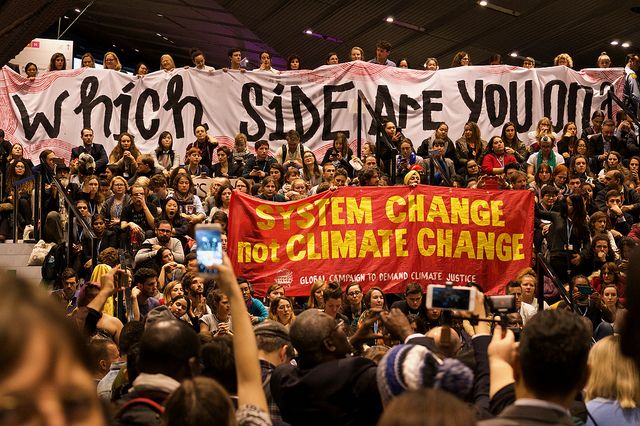
Climate Justice
What is climate justice?
Around the world, the effects of climate change are felt most acutely by people who are least responsible for causing the problem. Communities in the global South – as well as low-income communities in the industrialised North – are bearing the burden of rich countries’ overconsumption of our planet’s resources.
These are the people who have least access to resources and technology to adapt to the consequences and to act to reduce their emissions.
Climate justice means addressing the climate crisis whilst also making progress towards equity and the protection and realisation of human rights.
Scotland and other wealthy countries must live up to their historical, moral and legal responsibilities by going fossil free by 2030. They must also provide adequate and appropriate finances and transfer of clean technology for developing countries to repay their ‘climate debt’.
This is the minimum level that science and historical responsibility tell us is necessary to avoid catastrophic climate change.
Climate Justice also demands that the transformation in Europe should not leave anyone behind. In particular we demand a Just Transition, one that protects the livelihood of workers and ensures clean, safe and organized jobs in the new energy system.
Scotland must do our fair share
Climate change is a global problem that requires global action – every nation must do its share. However, some countries have not only contributed far more to the causes of climate change than others, but also have greater capacity to act to stop global warming. That is why we – along with climate justice allies around the world – believe that countries must do their fair share in tackling the climate crisis.
That means wealthy industrialised countries like Scotland must cut our emissions faster and help developing countries to adapt to the impacts of climate change while also improving standards of living by providing finance and sharing green energy solutions.
The Paris Agreement
In December 2015 world leaders came together in Paris to agree a new global treaty on climate change. The UN Paris Agreement commits nations to reduce greenhouse gas emissions to stabilising temperature increases to “well below 2ºC”. Crucially it also requires nations to pursue efforts to limit warming to the 1.5ºC threshold that is critical to the survival of many low lying and island nations, as well as many African nations.
Despite the high-level ambition of the Paris Agreement, the deal signed at the UN climate conference in 2015 is not strong enough to ensure that nations will play their part in meeting these targets.
Current pledges of emissions reductions under the Paris Agreement show that rich countries are failing to do their fair share of climate action, while many poorer countries have committed to doing their fair share or more.
The IPCC report
In October 2018, the Intergovernmental Panel on Climate Change (IPCC) released a ‘Special Report on Global Warming of 1.5C’ – the strongest warning yet of the dangers the world faces if urgent action is not taken by governments to cut emissions.
The report shows that limiting warming to the crucial 1.5ºC threshold set out in the Paris Agreement is still possible, but requires “rapid, far-reaching and unprecedented changes” in all aspects of society.
It warns what happens in the next decade is crucial, and that without urgent and transformational change we could hit 1.5ºC of warming as soon as 2030.
Learn more
- Use the Climate Fair Shares tool to find out more
- Read the Civil Society Equity reviews of Paris pledges and pre-2020 action
- Find out more about the Global Campaign to Demand Climate Justice
